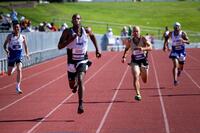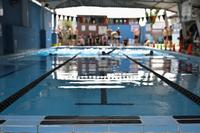Sleep is to the ability to recover as the sun is to daylight. You cannot have one without the other.
Sleep is, by far, our number one recovery tool. Even if all of the other elements of recovery are being met (nutrition, balanced training schedule, hydration), you can start to exhibit the symptoms of overtraining or being overstressed with a few nights of little or no sleep.
So how do we get better at sleeping? You have a lifting schedule, a running schedule and a work schedule. You should create a sleep schedule.
Here are symptoms of overtraining:
- Long periods of muscle/joint soreness
- Personality changes, including irritability, moodiness and depression
- Sick and injured more often
- Lack of motivation
- Lack of energy
- Loss of sleep
- Loss of muscle mass
- Loss of sex drive
Tips on how to make a sleep schedule:
Sleep clean: Take a shower or bath about an hour before bed. Soak or let the warm water hit your head and enjoy for five minutes, doing nothing but breathing deeply in and out.
Wind down: Whether it is after a long day at work, an evening workout or a late night working on a project, find some time to relax, hydrate and eat well (no stimulants/caffeine). You can do this by reading a book, magazine or light stretching for 20-30 minutes. Try to avoid too much TV, phones and computers during this part of the evening (about an hour before bed).
Easy music: Before you turn out the lights, have some easy music while you read or just sit and chill. Try to avoid war movies, horror movies and other violent television or reading. Lay off the video games as well. You are trying to make a peaceful setting in your room/house.
Keep it cool: Drop the temperature, if possible. If you have no air conditioning, take a shower before bed and turn on the fan. This will help to cool your body for up to 30 minutes and will help you fall asleep.
No phones: Keep the phone away from you. Charge it in the other room overnight or at least out of reach so you have to get up to answer it or use the alarm. Silence the notifications/ringer.
Keep it dark: Turn off all lights, the TV and computer. Shut the blinds, and turn on the fan to add white noise to the room as well as cooler temperatures.
Make a list: If you find yourself unable to go to sleep, one way to shut down the mind or to avoid scattered thoughts is to make a to-do list for the next day or week. Writing in a journal is also another way to help turn off the brain before bed.
Bedding: Nearly a third of our life is spent sleeping, so a bed is critical. I have tested out many during my travels and have found the Sleep Number works well for couples who like different bed softness. I doubt I could sleep in the same bed with my wife if I did not have the ability to make my side softer than hers. I also recommend memory foam-type mattresses for cooling and general recovery sleep.
Final ritual: Do something that signals to you that it is bedtime. Take off your watch or glasses. Get a bedtime cup of water to set by the bed. Let the pet out to use the bathroom. Brush your teeth.
These steps help create a sleep schedule for you. Find what works for you and do it religiously, and you will find sleep becoming more natural for you. If you find yourself with more than a few symptoms of overtraining or being overstressed, it could be more due to your lack of sleep than your overdoing it in the gym.
I understand that, as a parent, many of these rituals may not occur until after you have your children in bed. But just as you had the ritual working for your child, you need one for yourself: bath, comb hair, brush your teeth, bedtime story, sleep. That is the classic bedtime ritual we likely did growing up and did not realize. It worked back then and can work now.
Good luck with your sleep schedule. Once you build it, the sleep will come.
Related articles:
Stew Smith is a former Navy SEAL and fitness author certified as a Strength and Conditioning Specialist (CSCS) with the National Strength and Conditioning Association. Visit his Fitness eBook store if you're looking to start a workout program to create a healthy lifestyle. Send your fitness questions to stew@stewsmith.com.
Want to Learn More About Military Life?
Whether you're thinking of joining the military, looking for fitness and basic training tips, or keeping up with military life and benefits, Military.com has you covered. Subscribe to Military.com to have military news, updates and resources delivered directly to your inbox.


















